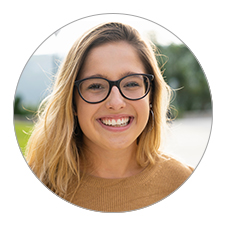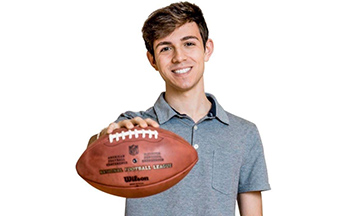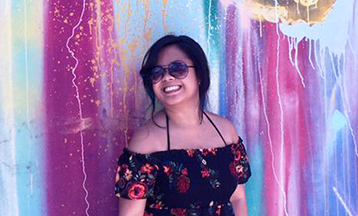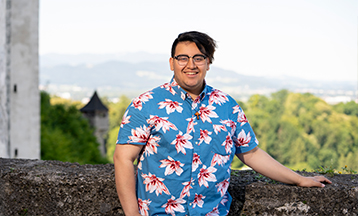-
About
Marist Commencement
Celebrating the Class of 2025
• The graduate ceremony will be held on Friday, May 23.
• The undergraduate ceremony will be held on Saturday, May 24.About
-
Academics
Marist Commencement
Celebrating the Class of 2025
• The graduate ceremony will be held on Friday, May 23.
• The undergraduate ceremony will be held on Saturday, May 24.Academics
-
Admission & Financial Aid
Marist Commencement
Celebrating the Class of 2025
• The graduate ceremony will be held on Friday, May 23.
• The undergraduate ceremony will be held on Saturday, May 24.Admission & Financial Aid
-
Student Life
Marist Commencement
Celebrating the Class of 2025
• The graduate ceremony will be held on Friday, May 23.
• The undergraduate ceremony will be held on Saturday, May 24.Student Life
- Athletics
Marika Cygert Image

Marika Cygert
Maspeth, NYAcademic School
Communication & the Arts, Social and Behavioral SciencesCampus
New YorkMarika Cygert ’20 is from Maspeth, New York. She is a communication major with a concentration in journalism, and she also minors in psychology.
What brought you to Marist? Why did you choose it?
My college counselor, Peter Wilson, recommended Marist to me. He inspired me to push myself while in high school and educated me on why my college career would be so important. He was my guide into a highly regarded college that would continue to shape me into a knowledgeable woman. My high school class was only about 75 students, so I was looking for a school that was bigger, but not too big. I also thought Marist was the perfect distance from home. In addition, I had heard great things about Marist’s communication program and faculty. Attending an International Baccalaureate program, I was used to a rigorous curriculum and was well prepared for what lay ahead of me at Marist.
Describe your Marist experience so far, both academics and extracurricular activities.
I feel greater appreciation for Marist even more now than I did my freshman year. The Hudson River is beautiful, and campus life is active and lively. My First Year Seminar on the meaning of life with [Associate Professor of Philosophy] James Snyder was terrific. I’m in the Honors Program, and I love it. The students are eager to learn, the classes are eye-opening and impactful, and we’re able to have really important conversations about weighty topics. I look forward to the opportunity of creating an honors thesis; it will be a rigorous process, but ultimately rewarding.
Are there specific faculty members who have really had an impact on you?
Apart from Professor Snyder, [Assistant Professor of Communication/Journalism] Kevin Lerner has been a big influence since he’s guided me through my journalism career at Marist. He’s also showed me what makes good journalism and the kind of journalist I want to be. I’d also point to [Associate Professor of Criminal Justice] Addrain Conyers who is advising me on my honors thesis. I took his class on race and ethnicity and we had the chance to discuss some very topical issues. Professor Conyers is great at including everyone in conversation, and he opened my eyes to being an ally, which inspired me to do more on campus.
The issue of diversity and inclusion is very important to you. Why?
I’m from Queens, a very diverse city. Organizing diversity-related events on campus has made my college experience more meaningful. It’s so important to be an ally, and I love doing what I can to bring people together. I am the president of Appreciating Races and Creating Opportunities (ARCO). We host a combination of fun, social and informative events designed to make people think about things they normally wouldn’t give much thought to. We have hosted events that celebrate Hispanic Heritage Month and the Day of the Dead, a discussion of how minorities are represented in media and a “share your story” night. More and more, I feel like this is my purpose in life. I want people from underrepresented groups to know that they can rely on me and that I’m doing my part to create an atmosphere in which diversity is cherished. It’s my job to help foster diversity and inclusion on campus. I’m an RA in an upperclassman residence hall, and I view that role as an opportunity to influence people by creating positive programming.
When people ask me what I did for Marist, I want to have an answer. I believe that going to college is more than just studying; it’s about leaving a legacy. I want to use my talents to leave Marist a better place than how I found it.
What do you want to do after graduation?
I see my future as being a working journalist in a newsroom. My dream job would be as a news anchor or reporter. Anyone who knows me would agree that an office job by my lonesome is not the job for me. I thrive best through interaction and engagement. I like the idea of being able to shape a story, open people’s eyes and have influence on the world. As a journalist, you have such a powerful platform, and good journalism is more important now than ever – it provides valuable information that bridges the gap between government and its citizens. Journalists guide citizens through everyday life and make issues and topics that seem so distant a closer reality. I hope to be a journalist who people respect, trust and value.



